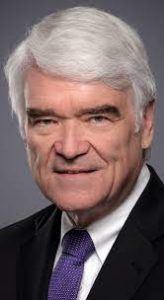
Chief Justice Nathan Hecht
Reversing the Beaumont Court of Appeals, the Texas Supreme Court has held that a late charge provision in an oil and gas lease called for simple, not compound, interest. The Court confirmed that Texas law disfavors compound interest and that an agreement that does not clearly and unambiguously specify compound interest will be interpreted as providing for simple interest.
Samson Exploration, LLC, f/k/a Samson Lone Star, L.P. v. Joe A. Bordages Jr., et al. (No. 22-0215; June 7, 2024) arose from a dispute over unpaid royalties owed under oil and gas leases operated by Samson on Bordages’ land. After Bordages sued, Samson paid the royalties plus late charges. The issue in the case involves whether the leases require Samson to pay additional late charges on the late charges, in effect resulting in liability for compound interest. In a sister lawsuit brought by another family with identical leases with Samson, a jury found Samson liable for fraud and awarded over $20 million in damages, including $13 million in late charges calculated at a rate of 18% per year, compounded monthly. In the Bordages’ case, the trial court likewise found liability for breach of contract and awarded the $13 million in contract damages, most of which is compound interest. The court of appeals affirmed.
In an opinion by Chief Justice Hecht, SCOTX reversed and remanded to the trial court for further proceedings. First, the Court tackled Bordages’ argument that Samson was collaterally estopped from challenging the trial court’s judgment because the same issue had been resolved in the sister case mentioned above. Samson countered that “because the construction of the lease’s text is an issue of law, and ‘[c]ourts disfavor applying collateral estoppel in the context of a pure question of law’” (citation omitted). Here, the issue was whether Bordages, a non-party in the first suit, could assert collateral estoppel in his case. “Nonmutual collateral estoppel is implicated in two situations,” Chief Justice Hecht wrote. “First, when a nonparty to an earlier action seeks to prevent an opposing party from relitigating an issue that the opposing party litigated in the prior action. Second, when a party to a prior action seeks to prevent a party in a later action who was a nonparty in the prior action from contesting an issue that was litigated in the prior action” (citations omitted). But, as the Chief pointed out, the Restatement (Second) of Judgments, § 29, recognizes an exception to the rule “that applies when treating an issue of law ‘as conclusively determined would inappropriately foreclose opportunity for obtaining reconsideration of the legal rule upon which it was based. Comment 1 to Section 29 elaborates, noting that nonmutual collateral estoppel cannot foreclose a reviewing court from performing its function of developing the law.”
Based on this “highest court” exception, the Court held that “nonmutual collateral estoppel will not prevent a party from relitigating an issue of law in this Court when we have not previously decided the issue and we deem the issue important to the jurisprudence of the state.” Turning to the interpretation of the Late Charge Provision in the lease, the Court explained that although it reviewed the sister case and remanded it to the court of appeals, it did not construe the Late Charge Provision. And although the Court subsequently denied Samson’s petition for review of the new court of appeals decision in the sister case, the Court “reinterate[d] that our denial of a petition for review does not indicate our views on the merits of any particular issue.” The Court determined further that this case raised “two previously undecided issues important to the State’s jurisprudence,” precluding the application of nonmutual collateral estoppel.
The two important issues, according to the Chief, were these: (1) “whether Texas law favors simple or compound interest in the absence of a written agreement on the applicable rate of interest”; and (2) “whether the Late Charge Provision contains an express stipulation to a compound rate of interest.” As to the first question, the Court stated that “[f]rom our earliest jurisprudence, the default rule has been that simple interest applies unless parties ‘expressly stipulate’ to compound interest.” This rule stems from policy considerations disfavoring usurious interest rates and is recognized by most jurisdictions. To the extent that the Court’s decision in Lewis v. Paschal’s Administrator, 37 Tex. 315 (1872) indicated that “the use of temporal language—such as ‘per annum’ or ‘annually’—could suffice for such an express stipulation,” that decision “was built on sand” and “we have long since reversed course.” From a policy perspective, the Chief went on, “a court’s application of compound interest to a contract where compound interest was never intended can easily transform a venture that was beneficial to both sides into an oppressive relationship.” The Court thus disapproved of Paschal’s Administrator and its progeny “to the extent that they were inconsistent” with the default rule.
The second question required the Court to “consider . . . what degree of clarity and specificity is required to expressly stipulate to a compound rate of interest.” Here the court of appeals erred because it “relief heavily on the Late Charge Provision’s statement that interest becomes ‘due and payable on the last day of each month’ (or stated differently, ‘due and payable [monthly]’). The Supreme Court deemed similar language in Cherokee Nation [v. United States, 270 U.S. 476 (1926)]. It should have been clear that such language falls short.” Temporal language such as that used in the Late Charge Provision, rather, generally indicates the time of payment, not a clear and unambiguous requirement of compound interest. In this case, “a plain reading of the Late Charge Provision shows that it calls only for simple interest.”












